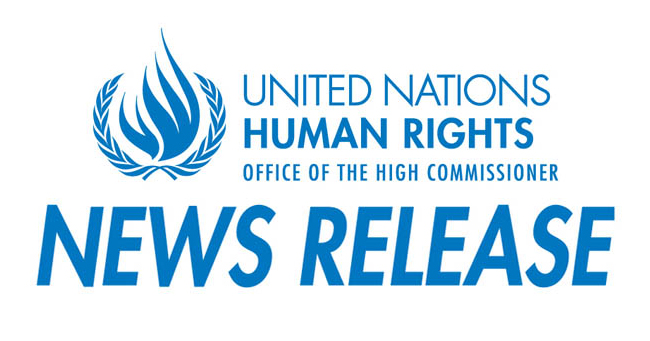3 May 2018 Geneva - As the world marks Press Freedom Day on 3 May 2018, the UN Special Rapporteur on the situation of human rights in Eritrea, Sheila B Keetharuth, has called on the Government to end its crippling restrictions on freedom of the press.
“Journalists remain at risk of arbitrary arrest, imprisonment and enforced disappearance in efforts to intimidate and control them, and these human rights violations happen with total disregard for the fundamental right to freedom of expression and information, as well as individual rights,” - Ms. Keetharuth.
“Freedom of expression is an inalienable right and includes the right to seek, receive and impart information and ideas, either orally, in writing, in the form of art, or through other forms of communication, including across frontiers,” she added.
“The actions of journalists are closely watched in Eritrea as a means of domination and instilling fear in an oppressive context where the media is fully state-owned. Arbitrary arrests and imprisonment are used to muzzle journalists and provoke a situation of self-censorship. No critical analysis or comment on government policies or actions are permitted,” the expert stressed.
According to public reports, the detention of two journalists in April 2018 following the funeral of the elder Haji Musa Mohamed Nur were recent examples of the continuing hostile environment in which journalists work in Eritrea, said Ms. Keetharuth. According to the reports, both journalists have now been released, but their arbitrary arrest was deplorable, she added.
The Special Rapporteur has documented more than 90 arrests of journalists in Eritrea since 1997. Although this figure is not exhaustive, she says it illustrates the precarious situation of journalists in the country.
Among those detained have been award-winning journalists, such as Dawit Isaak, who was awarded the UNESCO/Guillermo Cano World Press Freedom Prize in 2017 in recognition of his courage, resistance and commitment to freedom of expression. Dawit Isaak and other journalists arrested during a 2001 crackdown on the free press in Eritrea are still held incommunicado in an undisclosed location without charge, with no access to legal representatives and/or family, and with no indication that they will ever be tried in a court of law. Their state of physical and mental health is an ongoing concern.
“A free press is critical to the rule of law, ensuring that the population of the country is well-informed to foster participation and decision-making based on knowledge. An atmosphere in which freedom of speech and the press exist and where journalists can exercise their profession without fear brings transparency, which is much needed to hold those in power to account, thus promoting justice,” said the UN expert.
“The restrictions imposed on a free press by the Government of Eritrea are not proportional, not necessary for the interests of national security, public order or even national unity and constitute a violation of the right to seek, receive and impart information,” the Special Rapporteur emphasised.
ENDS
Ms Sheila B. Keetharuth (Mauritius) was appointed as the first Special Rapporteur on the situation of human rights in Eritrea in October 2012. From 2014 to 2016, she also served as a member of the Commission of Inquiry on Human Rights in Eritrea. Since May 2014, Ms Keetharuth has been an expert member of the Working Group on Extractive Industries, Environment and Human Rights Violations of the African Commission on Human and Peoples’ Rights. Until 2012, Ms. Keetharuth was the Executive Director of the Institute for Human Rights and Development in Africa in Banjul, The Gambia. She also worked with Amnesty International in Kampala, Uganda, and as a lawyer and broadcaster in Mauritius. In 2017, Ms Keetharuth was awarded with the Outstanding Alumni Achievement Award by the University of Leicester, in recognition of her human rights work.
The Special Rapporteurs are part of what is known as the Special Procedures of the Human Rights Council. Special Procedures, the largest body of independent experts in the UN Human Rights system, is the general name of the Council’s independent fact-finding and monitoring mechanisms that address either specific country situations or thematic issues in all parts of the world. Special Procedures experts work on a voluntary basis; they are not UN staff and do not receive a salary for their work. They are independent from any government or organization and serve in their individual capacity.
For more information and media requests, please contact:
Ms Birthe Ankenbrand
bankenbrand@ohchr.org | +41 22 928 9465 | or write to sr-eritrea@ohchr.org
For media inquiries related to other UN independent experts please contact:
Jeremy Laurence
UN Human Rights – Media Unit
jlaurence@ohchr.org | +41 22 917 9383
This year is the 70th anniversary of the Universal Declaration of Human Rights, adopted by the UN on 10 December 1948. The Universal Declaration – translated into a world record 500 languages – is rooted in the principle that “all human beings are born free and equal in dignity and rights.” It remains relevant to everyone, every day. In honour of the 70th anniversary of this extraordinarily influential document, and to prevent its vital principles from being eroded, we are urging people everywhere to Stand Up for Human Rights: www.standup4humanrights.org.


